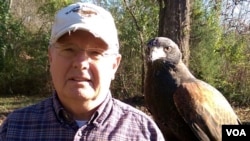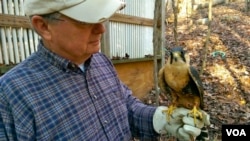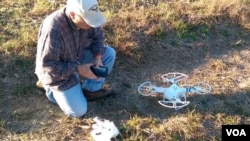It doesn't take long for one of Don Hervig's two Harris's hawks to snare a squirrel. The master falconer from Tullahoma, Tennessee, coaxes the bird to give up its catch with a piece of meat from an earlier outing and then it's back into the trees.
The hunt is very much a partnership between man and bird.
On this day, the inexperienced year-old male gets himself hopelessly tangled in some branches and Hervig gently works him free. Occasionally, he uses his walking stick to beat the underbrush, hoping to scare a rabbit into the open where the birds can take it.
"I don't always have to catch something," Hervig admitted. "Sometimes the squirrels are smarter than the hawks. Sometimes they get away."
Ancient sport
Falconry is a 5,000-year-old form of hunting using trained birds of prey to hunt wild game.
It’s believed to have originated in either ancient Persia or the Mongolian steppes. What is certain, though, is its popularity throughout Asia, Europe and the Middle East, from where the sport spread into the Islamic World.
For centuries, in all these regions, royalty and the social elite kept falcons for sport and hunting. Birds of prey were an important part of medieval trade. The sport did not take flight in the United States until the 20th century.
There are less than 3,000 falconers in the U.S. Part of the reason is that raptors are a protected species, and getting the licenses to keep them is expensive and time consuming.
And then, Hervig says, there's the training.
"You're an apprentice falconer for two years, and then if your sponsor feels good enough, he'll say you can move on to being a general falconer,” he said. “Then you have to be at that general class falconer for five years. Then after the end of that seven years, if you've done everything OK, you can be advanced to be a master class falconer."
These days there are high-tech toys that make the sport a bit easier, like a tiny tracking device that attaches to the bird's leg.
Hervig uses one to keep tabs on lost or wayward birds like his small, beautifully colored Aplomado falcon. It's still in training and has escaped before. To give it some exercise, he takes it to an open field where he uses a drone to put the bird through its paces.
He attaches a meat-filled lure on a long string to the underside of a quad-copter and flies it around the field for the raptor to chase down and snare.
Adaptable hunters
The range of game the birds can take is impressive. Everything from birds to squirrels to the oversized rabbits found in the American West.
Hervig takes his hawks to Texas once a year to hunt jackrabbits.
"Jackrabbits weigh about three times what these birds do,” he said. “If they catch them on the head, they can usually control them. But if they catch them on the butt, it's like the rodeo. It's quite a scene."
Hervig spends four to nine hours a week hunting with the birds.
On off days, he still spends 30 minutes or so just seeing to their care. It's a lot of work, but Hervig says he finds it more than worthwhile.
"I love just being in the woods and just watching the birds fly through the trees and watching them chase game."
Enjoying the woods and the birds may be his primary motivation, but Hervig has found a way to make the birds pay their own way. He now rents them out to local businesses.
He says a short visit by his raptors to a business or public space is usually enough to keep messy, noisy nuisance birds away for days, or even weeks.
LISTEN: Don Hervig talks about the sport of falconry


